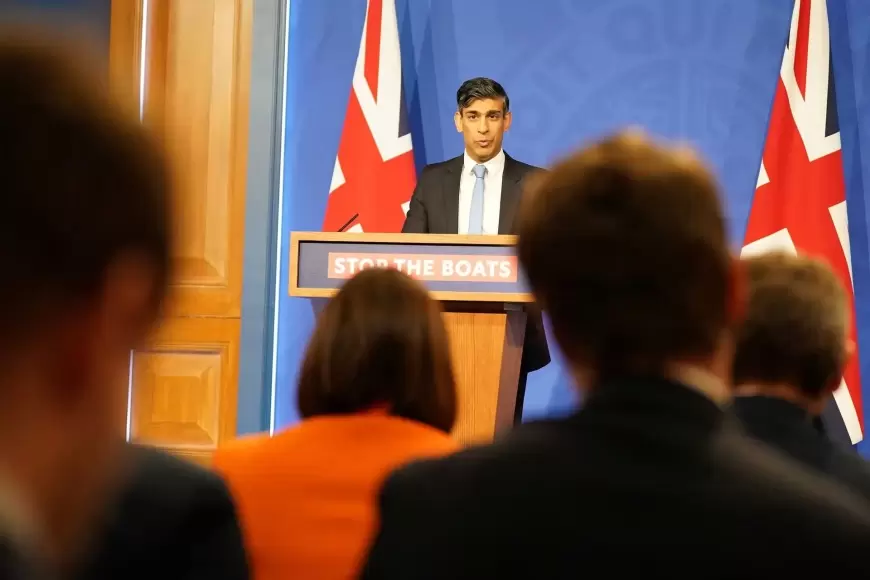Well, the lower house of British Parliament has passed the government's bill to send asylum seekers to Rwanda. This is a revised version of the bill.
The previous one was ruled unlawful by the Supreme Court last year. Prime Minister Rishi Sunak's government faced down a rebellion from members of its own Conservative Party who wanted the law made even tougher. The bill now moves to the House of Lords, where it is also expected to face opposition. The government wants to fly people who enter Britain illegally to Rwanda to claim asylum there instead.
The government says it is a fair way to deal with the influx of migrants in to the UK. Well, let's cross to our UK correspondent, Charlotte Chelsea-Pill, who's been following this story for us. Good to see you, Charlotte. Walk us through what happened today. Well, look, in an absolute nutshell, this was members of Parliament giving their backing to a controversial piece of legislation designed to get a controversial policy, this Rwanda policy, up and running. Does this mean that you will see flights taking off imminently sending asylum seekers here to Rwanda? No, it doesn't. There are a significant number of challenges that could still stop that from happening. But this is a clearing of a major hurdle.
And the Prime Minister Rishi Sunak will be breathing a big sigh of relief today. The political stakes are really worth talking about here. He really staked his premiership on being seen to deal with illegal migration, particularly in what's expected to be an election year. And some analysts even suggested that had this vote not passed, had it not gone the government's way, there could even be some sort of government collapse.
Such is the emphasis that Prime Minister Rishi Sunak has placed on being seen to deal with illegal migration. Now, I say it's been very controversial. His party has been tearing itself apart over this, as you alluded to.
Those on the right of this party are worried that this piece of legislation doesn't go far enough to ensure that flights are able to take off. Those on the more moderate side of this party have been very concerned that it goes too far.
They're concerned about anything that looks like it might defy the UK's international obligations. Now, it has gone through, but as I say, challenges ahead.
Yeah, many challenges. What's going to come next then? Well, next up, this goes to the upper house of Parliament, the House of Lords.
They are expected to pose significant challenges to this, block it perhaps at the very least, delay it. And the risk there is that you could see what's called ping pong between the two houses of Parliament, where it gets sent back to the lower house and they have to try and deal with perhaps a watered-down version. And there isn't much time for the Prime Minister here.
This is, as I say, meant to be an election year. He will want to see flights get off the ground before that happens. And I do just want to say as well that should the government, the current party, governing party not win the next election, the opposition party who are leading in the polls say they'll scrap it completely.
So there is still a long way to go for this policy. Charlotte Chelsea-Pill in London. Thank you so much.

![[WATCH] Julesboringlife Paqueta Video LEAK Viral On Reddit, Julesboringlife Kenan Haidar Leaked Video [WATCH] Julesboringlife Paqueta Video LEAK Viral On Reddit, Julesboringlife Kenan Haidar Leaked Video](https://www.sociallykeeda.com/uploads/images/202402/image_430x256_65de793c23584.webp)


![[WATCH VIDEO] Sophie Rain and sister Sierra Rain as Black Spiderman goes viral [WATCH VIDEO] Sophie Rain and sister Sierra Rain as Black Spiderman goes viral](https://www.sociallykeeda.com/uploads/images/202403/image_140x98_660976c59cce0.webp)





![[FULL WATCH VIDEO] Will Levis And Gia Duddy Leak Video Viral On Social Media [FULL WATCH VIDEO] Will Levis And Gia Duddy Leak Video Viral On Social Media](https://www.sociallykeeda.com/uploads/images/202405/image_140x98_6651e7ae8038d.webp)


